Conflict Zones
Russia-Ukraine war: List of key events, day 1,122 | Russia-Ukraine war News
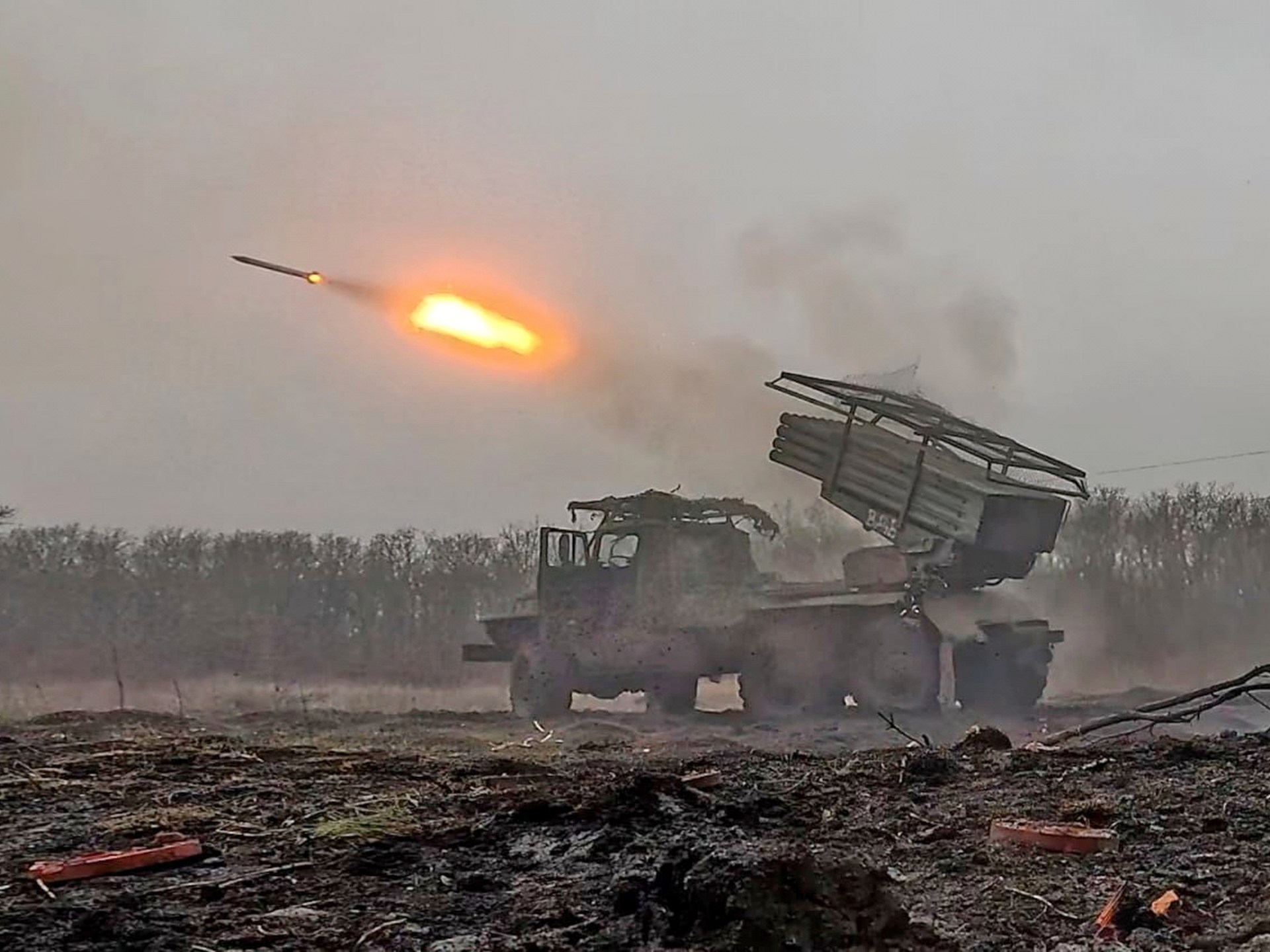
These are the key developments on day 1,122 of Russia’s war on Ukraine.
Here is the roundup of key events on Saturday, March 22.
Fighting
Russian attacks killed two people late on Friday in Ukraine’s southeastern city of Zaporizhzhia and three more in the country’s north and east, officials said. Zaporizhia regional governor, Ivan Fedorov, said nine people were also injured in the attack and the city had been struck more than 10 times.
CCTV footage recorded on Friday showed debris falling outside an apartment building following a loud explosion in Russia’s southern city of Rostov-on-Don. Rostov-on-Don’s acting regional governor, Yury Slyusar, said a Ukrainian drone struck an apartment building on the 17th floor, injuring two people.
Attacks took place in the southern Russian region of Voronezh, where regional governor Alexander Gusev said more than 10 Ukrainian drones were destroyed. No damage or casualties were reported.
Ukraine’s public prosecutor’s office said that Russia had dropped six glide bombs on the village of Krasnopillya in Ukraine’s Sumy region. In another village, two people were injured.
Air raid warnings were issued in the Ukrainian capital Kyiv and other parts of the country, with Kyiv Mayor Vitali Klitschko calling on people to seek shelter. According to Klitschko, debris from a downed flying object hit a building in the capital, causing a fire.
Satellite imagery showed craters and damaged bunkers at Russia’s Engels strategic bomber base after Ukraine struck it with drones on Thursday. The attack triggered a major blast and fire. The base in Engels hosts Russia’s Tupolev Tu-160 nuclear-capable heavy strategic bombers.
Ukraine accused Russia of illegally pressuring Ukrainians in occupied territory to change their legal status or leave and said it would report the practice to the International Criminal Court.
Russia – which now controls nearly a fifth of Ukraine’s territory – issued a presidential decree on Thursday saying Ukrainian citizens living “in Russia without legal grounds” should “regulate” their status by September.
Russia’s Ministry of Defence accused Ukrainian forces of blowing up a gas metering station near the town of Sudzha in Russia’s Kursk region, in what it described as a “deliberate provocation by the Kyiv regime … to discredit the US president’s peaceful initiatives”.
Ukraine’s military General Staff rejected Moscow’s accusations and blamed the Russian military for shelling the Sudzha gas metering station as part of Russia’s “discrediting campaign”. The gas metering station serves a major pipeline that had pumped Russia’s natural gas to Europe until supplies were halted last year.
Ceasefire
Talks between Ukrainian and United States representatives in Saudi Arabia on Monday will focus primarily on technicalities surrounding a potential limited ceasefire between Russia and Ukraine, Ukrainian Foreign Ministry spokesman Heorhii Tykhyi said.
Tykhyi reiterated that Ukraine had agreed to the US proposal for a full ceasefire lasting 30 days and again blamed Russia for the failure to implement any sort of ceasefire so far.
Ukrainian Foreign Minister Andrii Sybiha will not travel to Saudi Arabia for the talks, but Defence Minister Rustem Umerov is set to participate.
Western military planning to enforce a potential ceasefire in Ukraine is set to intensify in London next week as the United Kingdom said “nothing is off the table” over possible troop deployment for Kyiv. “Thousands” of personnel would be required to support any operation whether by “sea, on land or in the air” as allies prepare “for all eventualities” amid diplomatic efforts to end the war, the UK said.
Ukraine does not consider a United Nations mission an alternative to the deployment of a contingent of foreign troops or security guarantees to end the war with Russia, President Volodymyr Zelenskyy said. “With all due respect, the UN will not protect us from the occupation or [Russian President Valdimir] Putin’s desire to come back,” Zelenskyy said at a joint news conference with Czech President Petr Pavel in Kyiv.
Politics and diplomacy
North Korean leader Kim Jong Un expressed his unwavering support for Russia’s war in Ukraine during a meeting with a top Russian security official in Pyongyang, North Korean state media said.
Friday’s meeting between Kim and Sergei Shoigu, Russia’s Security Council secretary, followed a South Korean intelligence assessment in late February that North Korea had likely sent additional troops to Russia after its forces suffered heavy casualties fighting in the Russia-Ukraine war.
Shoigu conveyed a message from Putin, who extended his greetings to Kim and expressed gratitude for North Korea’s “solidarity with Russia’s position on all critical geopolitical issues, particularly on the Ukrainian issue”, according to his televised comments.
South Korea’s Foreign Minister Cho Tae-yul said military cooperation between North Korea and Russia must stop, and North Korea should not be rewarded for its wrongdoings in supporting the war in Ukraine.
Japan’s foreign minister told his Chinese and South Korean counterparts on Saturday that unilaterally changing the status quo by force was unacceptable. “On the situation in Ukraine, I emphasised the need for the international community to unite in calling out that any attempt to unilaterally change the status quo by force will not be tolerated anywhere in the world,” Takeshi Iwaya told reporters following trilateral talks in Tokyo with Beijing and Seoul.
Thousands of people demonstrated against Slovak Prime Minister Robert Fico on Friday, charging that he has authoritarian tendencies and a pro-Russian stance.
Serbia’s deputy prime minister said Russia’s spy services had helped Belgrade authorities respond to months of antigovernment protests, remarks which critics said revealed that the government had become dependent on Moscow.
“I am very grateful to Russia’s special services, which always support us in our fight against colour revolutions, primarily with information,” Deputy Prime Minister Alexandar Vulin said in an interview with Russia’s RIA state news agency.
Russia criticised the European Union’s plans to significantly boost the bloc’s defences.
The UK government said it had frozen more than 25 billion pounds ($32bn) in Russian assets since the start of the war in Ukraine three years ago.
Military aid
Germany’s Bundestag budget committee approved $3.25bn in additional military aid for Ukraine in 2025, a move welcomed by President Zelenskyy, who thanked Germany for the latest multibillion-euro aid package.
Conflict Zones
Russia-Ukraine war: List of key events, day 1,150 | Politics News

These are the key events on day 1,150 of Russia’s war on Ukraine.
Here is where things stand on Saturday, April 19:
Fighting
Russia launched eight missiles and 87 drones in an overnight attack on Ukraine on Saturday, causing damage in five regions across the country, the Ukrainian air force said. Air defence units shot down 33 Russian drones while another 36 were redirected by electronic warfare. Damage was recorded in five regions in the south, northeast and east.
A Russian missile attack killed one person in Kharkiv, while a drone attack killed another in Sumy, with at least five children among dozens injured. Kharkiv Mayor Ihor Terekhov said 15 residential buildings, a business and an educational facility were damaged in the attack.
The city of Zaporizhzhia was hit by a Russian drone during the night. Regional Governor Ivan Fedorov reported the attack on Telegram, saying a fire had broken out and emergency services were responding.
Russia claimed it targeted Ukrainian drone production sites and warned of escalation if Germany sends Taurus long-range missiles, calling it a step towards direct involvement in the war.
Politics and diplomacy
The US has put forward a proposal to end the war in Ukraine that includes lifting sanctions on Russia, Bloomberg reported, quoting unnamed European officials. The US plan “would effectively freeze” the conflict, with invaded Ukrainian territory remaining under Russian control, according to the report.
US Secretary of State Marco Rubio briefed NATO chief Mark Rutte on the plan, but warned Washington will “move on” if a ceasefire deal doesn’t appear viable within days.
President Donald Trump later warned that the US would “take a pass” on mediating peace if Moscow or Kyiv continue to hinder progress towards ending the war.
Russia and Ukraine will exchange 246 prisoners each on Saturday in a deal brokered by the UAE. The swap, the 13th mediated by Abu Dhabi, will add to a growing list of exchanges since 2022 and brings the total number of captives swapped to 3,233.
A Russian court has sentenced 19-year-old activist Daria Kozyreva to two years and eight months in prison for allegedly “discrediting” the army through antiwar graffiti and quoting 19th-century Ukrainian poetry. Amnesty International condemned the verdict as a “chilling” attack on peaceful dissent and called for Kozyreva’s immediate release.
Conflict Zones
Could an earthquake shift the balance in Myanmar’s civil war? | Military News
Bangkok, Thailand – As Myanmar slowly recovers from the magnitude 7.7 earthquake that killed thousands in March, an even greater catastrophe continues to shape the nation’s future – this one man-made.
Myanmar remains gripped by a civil war and after four years of fighting the military regime finds itself increasingly encircled.
But the impact of the earthquake could prove decisive for the conflict in the coming year.
Striking in Myanmar’s central Sagaing Region on March 28, the quake killed at least 3,649 people, with more than 5,000 injured and 145 still missing, according to figures from the military government.
The seismic shock flattened houses, factories, Buddhist pagodas, apartment blocks and brought down bridges and ripped up roads in Sagaing city and nearby Mandalay.
It also disrupted electricity supplies to factories producing munitions for the military, said Tin Lin Aung, a former major in Myanmar’s army who defected to the resistance movement in 2022.
In a clear sign that military supplies are stretched, bullet and artillery casings recently captured from government forces bear this year’s manufacturing date, Tin Lin Aung said.
“When I was in the military, we used to joke that some of the bullets were older than us,” he said.
“Now they are being used straight away,” he said.
The reported interruption to the military’s ammunition production comes as areas the army still controls in Myanmar are surrounded on almost all sides by longstanding ethnic armed groups and newer armed opposition forces.
Despite this, the military maintains an iron grip on the country’s major cities and core critical infrastructure.
Hemmed into urban strongholds, the military has tried to reverse its losses through indiscriminate air strikes and burning villages in rural areas – a campaign the United Nations suspects involves war crimes.

‘More momentum than the military’
Sagaing city was devastated by the quake and it remains under military control, while much of the surrounding countryside is governed by a patchwork of resistance militias – such as the People’s Defence Force (PDF) – which are loosely coordinated by the opposition National Unity Government (NUG).
The NUG declared a truce in earthquake-affected areas until April 20, except for “defensive operations”, yet the military’s operations have continued.
According to the NUG, the Myanmar military’s aerial and artillery attacks killed at least 72 civilians between the quake striking on March 28 until April 8. Two more civilians, including a 13-year-old girl, died from bombing by military aircraft on April 10, the Myanmar Now news outlet reports.
A Sagaing-based PDF fighter who requested anonymity said some rebel units had pivoted to relief efforts in central Myanmar even though their military adversaries were taking advantage of the lull in battle.
“Since the quake, the military has used the Sagaing-Monywa road more confidently because of the truce,” she said. But PDF forces in Sagaing expect fighting to intensify after the April truce is over.
“The PDF has more momentum than the military here,” she told Al Jazeera, adding that the NUG is now “coordinating better with ethnic armed organisations”.
“There will be more fighting in coming months,” said Ko Ko Gyi of the Sagaing PDF’s Battalion 3.
Regional security analyst Anthony Davis said he doubted the earthquake would distract the military from its strategic objectives, adding that most soldiers had stayed in their garrisons rather than help with relief efforts.
“The military isn’t taking time off to save people. They’ll keep up the air strikes and, where possible, launch ground offensives to weaken the PDF,” Davis said.
But it is western Rakhine State – largely spared from the earthquake – that is still the most consequential battleground currently, he said.
There, the rebel Arakan Army (AA) has clashed with the military’s forces around the state capital Sittwe and Kyaukphyu, the site of a key pipeline that transports gas from across Myanmar to China.
The AA has simultaneously pushed out of its home territory in the west of the country and into Myanmar’s central heartlands in Magwe, Bago and Ayeyarwady regions, Davis said.
“They are the swing player who can significantly move this conflict one way or another,” he added.
Commanding an estimated 40,000 soldiers, the AA has a proven record of defeating the military regime’s forces.
In eastern Myanmar’s Kayah State, a senior resistance commander said the earthquake had underscored the suffering of displaced communities who “bear the brunt of the ongoing wars”.
“The side who’s willing to care for the people can sway public opinion and will succeed in the coming battles,” he said.
In the north and northwest, the military is on the back foot.
The Kachin Independence Army captured Indaw town in the northern Sagaing Region on April 7 after an eight-month siege, despite declaring its own post-quake truce. Chin resistance forces recently gained control of Falam township in western Myanmar – though they had not announced any ceasefire.
Political analyst Kyaw Hsan Hlaing said the military is still grappling with the aftermath of the earthquake and that may create openings for the AA and others to seize more towns.
“However, any such gains would likely be incremental, as the military’s longstanding control and ability to adapt, especially in regions like Bago and Magwe, even under crisis conditions remain significant,” he said.
“In the long term, the earthquake is unlikely to fundamentally shift the balance of power in Myanmar,” he said.
‘Divine intervention’
While the earthquake has not dealt a decisive blow to military rule, the quake has delivered a psychic shock to the regime’s generals.
In a country where astrology and superstition guide the highest political decisions, many interpret the natural disaster as a cosmic rebuke against Myanmar’s military leadership.
“They see this earthquake as divine intervention – punishment for the mistakes of the king. From what I hear, they are not blaming him [regime leader Min Aung Hlaing] directly. But there are questions about his leadership and capacity,” said former major Tin Lin Aung, who still maintains contacts within the secretive military establishment.
According to Tin Lin Aung, the regime has ordered civil servants nationwide to recite a protective Buddhist chant nine times daily for nine consecutive days. The number nine has auspicious symbolism in Buddhist tradition.
He also described growing confusion within the ranks over the regime’s response to the earthquake – appealing for international aid and assistance, declaring a truce, while also continuing its attacks.
“They know the people hate them more and more, and their leader seems lost,” he said.
Richard Horsey, senior Myanmar adviser at the International Crisis Group, said even if Myanmar military’s commander-in-chief Senior General Min Aung Hlaing dismisses these supernatural interpretations, the fact that his inner circle takes them seriously creates real vulnerability. Instead of causing an internal coup, he suggested the quake as a bad omen would more likely signal the erosion of Min Aung Hlaing’s authority and the rise of open criticism.
“You go from there to people feeling they can just ignore his orders and do their own thing because everyone else agrees with them, not him,” he said.
Political analyst Kyaw Hsan Hlaing said some sources suggest that beliefs in the quake as a portent of collapse for military rule may be used to push the narrative that the regime needs to “act decisively to regain control”.
Superstition is just one of many factors shaping the military’s decisions in the conflict, he added.
The earthquake has also “done enormous damage to the basic fabric of Myanmar,” Horsey said, noting that Mandalay’s residents are potentially facing relocation due to extensive housing damage.
Given the scale of the quake, it would likely affect the civil war – “but in ways that are hard to predict”, he said.

Criticised for its ineffectual and disinterested response to earthquake victims, along with continued attacks at a time of national emergency, the military’s poor reputation has plummeted even further in the eyes of the people and its adversaries.
The powerful ethnic armed groups involved in the conflict will probably be even more unwilling to negotiate for peace with the military following the quake, Horsey said.
“Even if you could get a spirit of compromise, which seems not to exist”, few would believe the military’s sincerity in adhering to any peace deal or ceasefire document.
“Who would believe that piece of paper,” Horsey said, when it is signed by a military that is considered “so illegitimate and so incompetent.”
Conflict Zones
Trump says US may ‘pass’ on helping end war if Russia, Ukraine resist deal | Russia-Ukraine war News
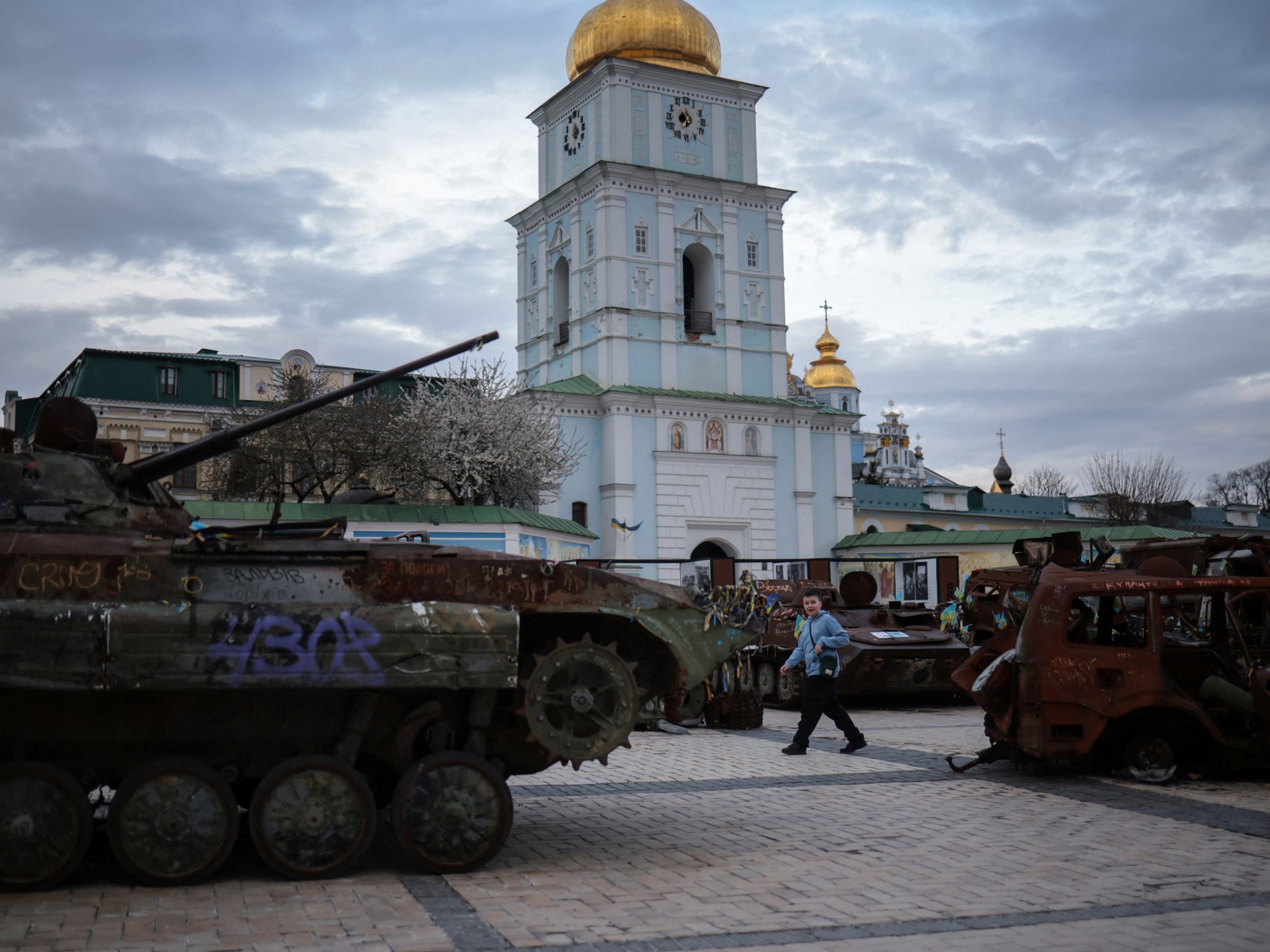
President Donald Trump says the United States will “take a pass” on trying to resolve the Russia-Ukraine war if either Moscow or Kyiv makes it too difficult to end the conflict.
Trump was speaking after US Secretary of State Marco Rubio commented – following talks with European allies in Paris – that Washington would “move on” if a truce did not seem “doable” within days.
The US president refused on Friday to cast blame on either Russian President Vladimir Putin, who ordered the February 2022 full-scale invasion of pro-Western Ukraine, or Ukrainian President Volodymyr Zelenskyy. But he insisted both sides had to make progress.
“Now, if, for some reason, one of the two parties makes it very difficult, we’re just going to say: ‘You’re foolish. You’re fools. You’re horrible people’ – and we’re going to just take a pass,” Trump said.
“But, hopefully, we won’t have to do that.”
Rubio further suggested on Friday that Trump’s patience towards the negotiations is running thin.
“If it’s not possible, if we’re so far apart that this is not going to happen, then I think the president is probably at a point where he’s going to say, ‘Well, we’re done,’” he said.
Trump told reporters on Friday, however, that he did not want to say he was walking away from the talks. He said he still believes there is a good chance to end the conflict.
“It’s coming to a head right now,” he said.
US Vice President JD Vance also said he was “optimistic” a resolution could be reached, while speaking on a trip to Rome.
‘Trying to help’
Ukraine has agreed to a full temporary ceasefire and accused Russia of stalling on a deal to get a better negotiating position.
Putin last month rejected a joint US-Ukrainian proposal for a full and unconditional pause in the conflict, while the Kremlin has made a truce in the Black Sea conditional on the West lifting certain sanctions.
When asked if Putin was stalling, Trump, who held direct talks with the Russian leader in February, said: “I hope not … I’ll let you know soon.”
Trump also denied he was being “played” by the former KGB agent, who denied Russia was going to invade right up until the eve of the attack.
“Nobody’s playing me, I’m trying to help,” Trump said.
Russia’s Foreign Minister Sergey Lavrov said in an interview with the Kommersant newspaper published on Monday that it is “not easy” to agree on “key components” of a peace deal.
He did, however, concede that the Trump administration is trying to understand the “root cause” of the conflict, which he said was triggered by “the actions of Washington and Brussels” in having “brought the current regime to power in Ukraine”.
Fighting continues
Amid ceasefire negotiations, on the front line on Friday, a Russian missile strike killed one person in the northeastern Ukrainian city of Kharkiv, with a separate drone attack killing another person in the nearby city of Sumy.
At least five children were among dozens of people injured in Friday morning’s attack on Kharkiv that damaged 15 residential buildings, a business and an educational facility, according to Kharkiv Mayor Ihor Terekhov and emergency services.
Reporting from Kyiv, Al Jazeera’s Zein Basravi said Russia also targeted Lviv, Dnipro, Mykolaiv and Kyiv.
“We saw multiple missile, drone, artillery and rocket attacks in cities across the country about 5am local time when curfews come to a close and people begin their daily lives,” he said.
“[In Kharkiv], civilian infrastructure was damaged, one person was killed, and 74 were injured. Of the 74, five were children,” Basravi reported.
President Zelenskyy said on Thursday that although Russia had seemingly scaled back its targeting of energy infrastructure, the overall volume of missile and drone attacks remained unchanged. It is striking Ukraine’s civilian sites instead, he added.
Russia has said it had hit “key drone production sites” and Ukrainian military airfields.
Moscow also warned on Friday of potential escalation if Germany proceeds with plans to send Taurus long-range missiles to Ukraine. Speaking at the United Nations on Thursday, Russia’s ambassador, Vassily Nebenzia, declared that such a move would mark Germany’s direct entry into the war.
“These countries are waging a war against Russia using their proxy forces,” he said. “Delivering Taurus missiles would be another step toward escalation.”
-

 Education2 days ago
Education2 days agoHarvard’s battle with the Trump administration is creating a thorny financial situation
-

 Middle East1 day ago
Middle East1 day agoTunisian court hands opposition figures lengthy jail terms | Human Rights News
-

 Sports2 days ago
Sports2 days agoClint Dempsey speaks to CNN over his concerns over the USMNT heading into its home World Cup
-
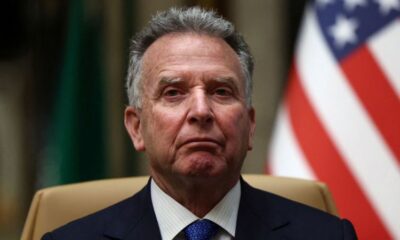
 Europe2 days ago
Europe2 days agoTrump’s ‘lone ranger’: How Steve Witkoff became the defacto point man on America’s foreign policy challenges
-
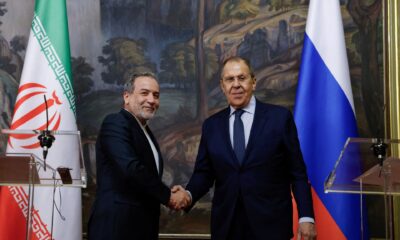
 Conflict Zones2 days ago
Conflict Zones2 days agoIran has ‘doubts’ about US intentions ahead of nuclear talks | Politics News
-
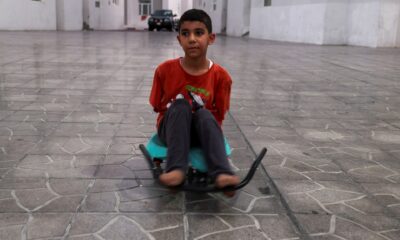
 Conflict Zones2 days ago
Conflict Zones2 days ago‘How do I live like this?’ asks Gaza boy who lost arms in Israeli attack | Gaza News
-

 Conflict Zones2 days ago
Conflict Zones2 days agoTrump says US may ‘pass’ on helping end war if Russia, Ukraine resist deal | Russia-Ukraine war News
-

 Sports2 days ago
Sports2 days agoMax Verstappen dismisses concerns over possible Red Bull exit after turbulent start to season




